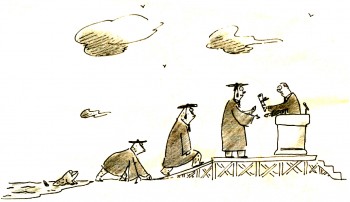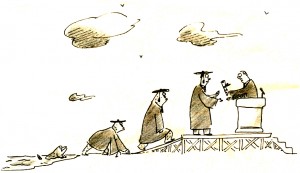Serendipitous Discovery
Too much “learning” nowadays is focused on rote memorization of received wisdom. The environment is so controlled it all but eliminates the possibility of serendipitous discovery and equally serendipitous insight into the connections between lab and reality.
ere’s a somewhat irrelevant fact — I grew up mixed race in Jim Crow Louisiana. I didn’t know it at the time, but I was legally black in my home state until 1983. Still, I lived in a “white” neighborhood, with people fond of the Ku Klux Klan — yet who devoutly worshiped in the Southern Baptist church or even the Catholic church on weekends. They were afraid of blacks, Hispanics, even Asians back then.
Though their power to oppress those groups has largely worn away, they greatly fear anyone different — and what you propose is a curriculum that would teach people to embrace their differences, to become more of an individual rather than a conformist. When you look at the school curriculum in a state like Virginia today, which is largely developed around a state-administered standardized test, you do not see an emphasis on, nor a desire for “critical thinking, creativity, self-reliance, innovation and motivation, as well as building a foundation for free thinking – healthier – minds.” The emphasis is on regurgitating, and ultimately doing, just what one is told.
Too much “learning” nowadays is focused on rote memorization of received wisdom. It’s a problem from both sides of the spectrum — from educators who want an objective measure of results to students who only want to be told what they need to know for the test. Inquiry beyond following the same old steps in the same old set-piece labs is often discouraged. The environment is so controlled it all but eliminates the possibility of serendipitous discovery and equally serendipitous insight into the connections between lab and reality.
Of course, asking students how they would define consciousness might get them engaged in the discussion from the start (but often asking students to get involved in ANY discussion yields a lot of annoyed stares). I haven’t seen a definition of consciousness — not that I ever came up with one myself when broaching the subject in the biology classes I taught.
In my geography classes, I try to get students to become aware of the landscape around them. Situational awareness can, of course, enhance their survival, but I want them to do things like make the connection between the distribution of payday lenders, for example, and the socioeconomic characteristics of the neighborhoods where those businesses occur. For me, much of what I teach is about direct, physical experience of the landscape around you — but I get criticism from students who presume to tell me (and administrators) that it has nothing to do with geography. If what I taught didn’t come out of the review section of a boringly written geography textbook, it can’t be geography, right?
I guess the relevance here is that administrators and many students are suspicious of the legitimacy of personal experience (the students are taught to be that way, and those teachings carry into adulthood). I was, in yet another boring example raised a Catholic. One message I frequently received was that sex, with oneself or others, is sinful. Sex may be natural, but nature equals sin, therefore the only way to avoid sin is to deny nature.
Whether we’re dealing with sex or something else, we constantly get these signals to deny our nature in many aspects of our lives. The paradox here (at least it seems like a paradox at this hour) is that you’re proposing to do something that runs counter to American tradition — to embrace our nature rather than deny it, to learn from it rather than be skeptical of it
The success of your initiative would threaten to break the conformists’ stranglehold on education and society. I grew up in a time when those of that ilk were ready to kill rather than give up that kind of power. The society I live in has evolved somewhat from the 60s and 70s, but I fear that progress could evaporate on a moment’s notice. (Maybe it’s post-traumatic stress disorder on my part — as I age, I become more of an angry off-white man.)
Now if you can reach the students early enough, you may win some converts, but those successes will prove the danger of your ideas to the status and security of those who have appointed themselves controllers of primary and secondary education in this country.

















